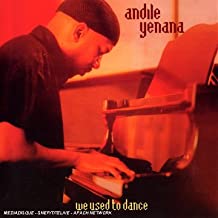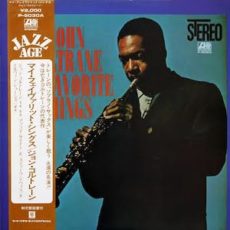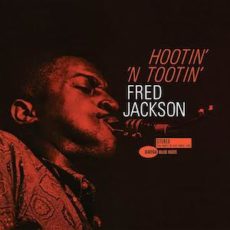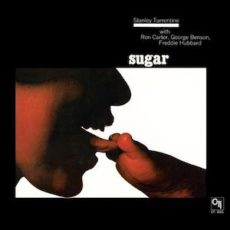
Daily Dose Of Jazz…
Andile Yenana was born on August 9, 1968 in King William’s Town, South Africa. His love of music was triggered at an early age and he grew up in a household where music was really loved. His father, Felix Thamsanqa Yenana, had a huge collection of music, ranging from jazz to Motown, and other forms of urban black music and this had a huge influence in his life.
Andile began music studies under Darius Brubeck at the University of Natal’s School of Jazz and Popular Music It was here that he became friends with saxophonist Zim Ngqawana and trumpeter Feya Faku.
Joining the Zim Ngqawana Quartet and worked with Zim on all five of his albums, including San Song recorded with Bjorn Ole Solburg and his Norwegian San Ensemble. He also worked on the Pan-African music project Mahube with saxophonist Steve Dyer and others. He has also worked as arranger for Sibongile Khumalo, Gloria Bosman and Suthukazi Arosi. In 2005 he was selected as the 2005 Standard Bank Young Artist for Jazz.
Pianist Andile Yenana, who made an indelible mark on the industry by switching from teaching to studying jazz, continues to perform and record.
More Posts: history,instrumental,music,piano

Requisites
My Favorite Things ~ John Coltrane | By Eddie Carter
I was reading a few nights ago and wanted something to listen to before heading to bed, so I pulled out an old favorite that always transports me back to my childhood and still blows me away every time I hear it. This morning’s subject of discussion is My Favorite Things (Atlantic 1361/SD 1361) by John Coltrane that hit the stores in 1961. It is one of the most important albums in his discography and is a beloved record in my library. The personnel is a stellar one, Coltrane on soprano sax (tracks: A1, A2), tenor sax (tracks: B1, B2), McCoy Tyner on piano, Steve Davis on double bass, and Elvin Jones on drums. My copy used in this report is the 1971 Atlantic Jazz Age Series Japanese Stereo reissue (Atlantic P-6030A) by Warner-Pioneer Corporation.
Side One starts with a show tune from The Sound of Music (1959), My Favorite Things by Richard Rodgers and Oscar Hammerstein II. It became a huge hit for Coltrane and his signature song whenever he performed live. The trio opens with a highly contagious introduction, segueing into a beautifully constructed melody by the saxophonist. McCoy kicks off the first solo with a captivating reading that is a feast for the ears. John comes in slowly, then takes flight into the stratosphere with a joyously unrestrained statement that swings until it returns to earth for the climax. Everytime We Say Goodbye by Cole Porter is a beautiful song that Coltrane adapts as if it was written just for him with an elegantly graceful melody and opening statement. Tyner speaks with delicacy on the closing reading ahead of the foursome’s gentle ending.
Side Two takes off with a spirited version of Summertime by George and Ira Gershwin, and DuBose Heyward. John is ablaze from the start of the melody and ascends to an exhilarating height on the opening chorus. McCoy supplies the high-octane fuel for the second performance. Steve executes the next reading meticulously with great precision, and Elvin delivers a fierce attack on the finale into the quartet’s exit. But Not For Me by George and Ira Gershwin first appeared in the musical, Girl Crazy (1930). The quartet kicks off this energetic cooker with a vigorous theme. John builds the first interpretation with blazing heat to Steve’s bass and Elvin’s impressive timekeeping, then Tyner adds his imaginative ideas on the next statement into Trane’s aggressive improvisation during the closing chorus.
Nesuhi Ertegun supervised My Favorite Things, and the engineers are Phil Lehle and Tom Dowd. Together, both men provide a solid soundstage that is good enough to transport the listener to the studio with the musicians. For me, this album is an intriguing examination of the thin lines between Hard-Bop, Modal, and Free Jazz that still sounds as fresh today as when first released sixty years ago. If you are a fan of tenor sax or are just discovering the music of John Coltrane. I offer for your next vinyl hunt, My Favorite Things. An album of soothing and swinging music that I am sure will become a welcome addition to your library.
~ Everytime We Say Goodbye, Summertime, But Not For Me – Source: JazzStandards.com ~ My Favorite Things – Source: Wikipedia.org © 2021 by Edward Thomas Carter
More Posts: choice,classic,collectible,collector,history,instrumental,jazz,music,saxophone

Requisites
Hootin’ ‘N Tootin’ ~ Fred Jackson | By Eddie Carter
Submitted for your approval from the library this morning is an album by tenor saxophonist, Fred Jackson who began his brief career in 1951 as an R&B saxophonist with Little Richard. A decade later, he worked with blues legend, B.B. King, and has also appeared on a few other Blue Note albums before leaving the jazz scene during the mid-sixties. Fred recorded and released his only album as a leader, Hootin’ ‘N Tootin’ (Blue Note BLP 4094/BST 84094) in 1962. Here, he is working with Earl Van Dyke on organ, Willie Jones on guitar, and Wilbert Hogan on drums. The program consists of seven original tunes by the saxophonist and my copy used in this report is the 1992 Toshiba-EMI Limited Japanese Stereo reissue sharing the original catalog number.
Dippin’ In The Bag starts Side One with a delightfully perky introduction by the quartet. Fred opens with a relaxing theme moving with a spring and a bounce in its step, then Willie constructs a spirited statement that flows steadily into Fred’s final comment ahead of the foursome’s closing chorus fading from view. Southern Exposure is a slow-paced succulent meal introduced by Jones and the rhythm section with some soulful, home-cooking. Jackson brings the fried chicken, black-eyed peas, and collard greens to the melody and adds the potato salad for the first reading. Van Dyke serves the steak and burgers with a highly seasoned sauce on the next interpretation. Jackson wraps up the bluesy meal with a tasty dessert preceding the quartet taking their leave after an enjoyable dinner.
Preach Brother moves the pace to a medium-fast tempo with a spirited church-like feel propelled by Hogan’s drums. Fred delivers the opening chorus and first sermon with a groove that just will not quit. Willie gives the next talk and has fun for one verse. Earl sums up the lesson jumping for joy in the finale ahead of the ensemble’s exit. Hootin’ ‘N Tootin’ begins Side Two with a brisk introduction and melody in unison with an emphasis on lively statements from everyone. Jackson is up first with a swinging reading, then Jones offers a moment of hard cooking. Van Dyke takes an enjoyable romp on the next solo, followed by a short exchange between Hogan and Jackson. The drummer provides an exclamation point with his only solo before the ending.
Easin’ On Down takes the foot off the accelerator for a carefree collective theme with everyone right at home. Fred breaks the ice first with a carefree, easy-going swing. Willie supplies a laid-back response on the next solo. Earl steps into the spotlight last on a smooth course towards Fred’s return with a closing message into the climax. That’s Where It’s At picks up the pace again with the foursome suggesting a skillful virtuosity that is irresistible. One thing piquing my interest is the quote of the Black spiritual, Wade In The Water (1901) in the tenor saxophonist’s and organ’s solos. Jackson burns brightly on an exceptional first statement. Van Dyke also cooks with imaginative verses that crackle and Jones has a feisty performance in-between.
Earl leads off Way Back Home with a brief introduction making everyone feel comfortable as Fred states the mellow opening chorus. He continues providing the spark on the first solo, then Willie executes the next reading proficiently. Earl delivers a highly effective closing statement before the ensemble wraps it up. After Hootin’ ‘N Tootin’ was released, Fred Jackson returned to record his second album at the Van Gelder Studio with the same group plus Sam Jones. Due to poor sales of his debut, the other seven selections weren’t released until they appeared on the CD album of Hootin’ ‘N Tootin’ (1998). Jackson appeared on three other albums for Blue Note as a sideman, Face to Face (1961), Along Came John (1963), and The Way I Feel (1964)!
The music on Hootin’ ‘N Tootin’ is perfect to enjoy at the start of your day or after work, during or after dinner, or for late-night listening. The sound quality is good, but not great. The problem is the microphone placement for the organ is over-modulated when Earl Van Dyke is accompanying Fred and Willie’s solos throughout the album. The only other time I experienced this on a Rudy Van Gelder recording was on Open House (1966). Despite this issue, if you are a fan of Soul-Jazz or jazz organ with a bop flavor, I offer for your consideration, Hootin’ ‘N Tootin’ by Fred Jackson, a tenor saxophonist whose career deserved a better fate and whose music deserved greater recognition!
~ Along Came John (Blue Note BLP 4130/BST 84130), Face to Face (Blue Note BLP 4068/BST 84068), Hootin’ ‘N Tootin’ (Blue Note Connoisseur Series CDP-21819), Open House (Blue Note BLP 4269/BST 84269), The Way I Feel (Blue Note BLP 4174/BST 84174) – Source: Discogs.com © 2021 by Edward Thomas Carter
More Posts: choice,classic,collectible,collector,history,instrumental,jazz,music,saxophone

Daily Dose Of Jazz…
Rodrigo Amado was born in Lisbon, Portugal on July 15, 1964 and began studying the sax at the age of 17, briefly at the Hot Club Music School of Lisbon and with mentors Carlos Martins, Pedro Madaleno, and Jorge Reis.
With diverse musical interests, he explored improvisation in other genres, including his work with his various ensembles like the Lisbon Improvisation Players and the Motion Trio with Miguel Mira and Gabriel Ferrandini. He is an in~demand studio player on numerous recorded projects.
He started his own label Clean Feed in 2001, with brothers Pedro and Carlos Costa, before leaving the imprint in 2005 to start a second label, European Echoes. Also an accomplished professional photographer, Amado continues to be a bright light on the Portuguese and international improvisational jazz scene.
Saxophonist Rodrigo Amado continues to specialize in free-form, composition-in-the-moment jazz, and his various projects and trios have given him an international following.
More Posts: bandleader,composer,history,instrumental,music,saxophone

Requisites
Sugar ~ Stanley Turrentine | By Eddie Carter
The landscape of jazz was changing as it entered the seventies. Miles Davis began pushing the envelope from Hard-Bop and Post-Bop to Jazz Fusion with In A Silent Way (1969), and Bitches Brew (1970) would take it further in that direction. Due to his commercial success with Bitches Brew, some musicians also moved from those styles into Avant-Garde and Free Jazz. Still, others began a journey toward what would eventually be labeled Smooth Jazz. Stanley Turrentine, a veteran Soul-Jazz tenor saxophonist since the fifties had just ended a decade-long association with Blue Note that began with his debut, Look Out (1960), and was looking to build his audience. He signed with CTI Records in 1970, the independent label owned by producer Creed Taylor which originally began as a subsidiary of A&M Records in 1967.
Though no one knew it at the time, Sugar (CTI Records CTI 6005) would become the biggest selling album of Stanley’s career and the title song, a phenomenal hit earning him the nickname, “The Sugar Man”. The record’s success was also instrumental in changing the direction for future CTI releases toward more Jazz-Funk and Funk-Soul albums. Stanley is joined by an impressive supporting cast, label mate Freddie Hubbard on trumpet, Lonnie Liston Smith (track: A1) on electric piano, Butch Cornell (tracks: A2, B1) on organ, George Benson on guitar, Ron Carter on bass, Billy Kaye on drums, and Richard “Pablo” Landrum (tracks: A2, B1) on congas. My copy used in this report is the 2009 Pure Pleasure Records UK Stereo Audiophile reissue (PPAN CTI 6005).
Side One starts with Stanley’s original, Sugar. The rhythm section begins at mid~tempo with an infectious introduction hooking you from the opening notes. The front line presents the melody with a lightly swinging beat. Stanley strides confidently into a danceable lead solo. Freddie settles into a funky groove on the second statement. George tells the next story with some bluesy guitar work and assistance from both horns providing a rhythmic supplement for one chorus. The ensemble reprises the melody and disappears into a slow fade.
Sunshine Alley by Butch Cornell opens with Cornell leading the rhythm section fueled by Kaye’s hypnotic drums and Landrum’s soulful conga. Both horns take it from there on the bluesy theme. Cornell, who I was unfamiliar with before his appearance here, easily holds his own with a convincing lead solo. Benson gives a splendid performance with the rhythm section slipping neatly alongside. Hubbard cooks up something good next, then Turrentine adds some soul food to the final solo that reaches a peak of inspiration preceding the ensemble taking the song out.
The group closes with a vigorous blowing rendition of John Coltrane’s Impressions occupying Side Two. Butch starts the song with a soulful introduction. The front line provides the spark on the main theme to “get this party started” as my wife likes to say. Stanley takes off first at a hard-swinging gallop. Butch comes in next for a vigorous interpretation with both horns humming behind him. Freddie brings an electrically charged dynamism to the third solo with compelling intensity. George adds a bit of excitement to the final reading with some high-voltage licks. Stanley punctuates the closing chorus with final phrases of white heat into an energetic fadeout.
The impeccable rhythm section of Ron Carter, Billy Kaye, and Richard “Pablo” Landrum is the power station behind each soloist, giving the album its depth. The remastering of Rudy Van Gelder’s original recording by Kevin Gray and Steve Hoffman is exemplary. The vinyl is quiet until the music starts, and the LP is a sonic treat for your ears with a spacious soundstage that’s stunning. There’s something for everyone on Sugar by Stanley Turrentine. It’s a Soul-Jazz buffet of his tenor sax, a swinging group, and an irresistible groove that’s sure to make it a favorite in any jazz library!
~ Bitches Brew (Columbia GP 26), In A Silent Way (Columbia CS 9875), Look Out (Blue Note BLP 4039/BST 84039) – Source: Discogs.com © 2021 by Edward Thomas Carter
More Posts: choice,classic,collectible,collector,history,instrumental,jazz,music,saxophone



